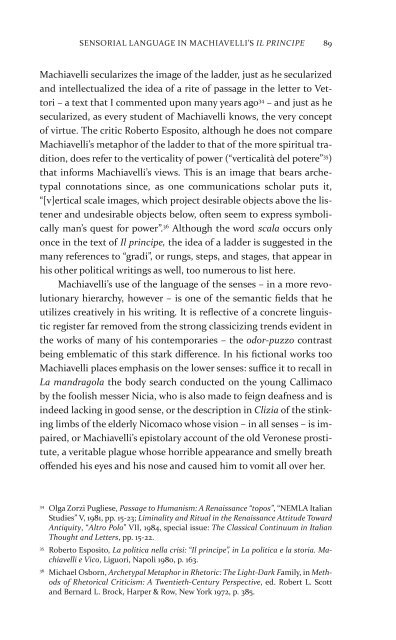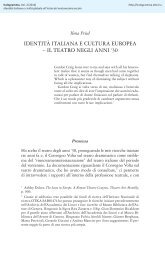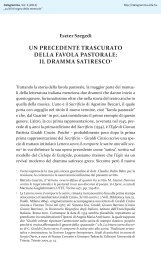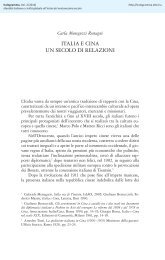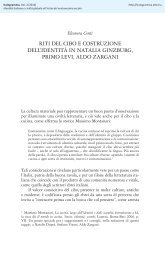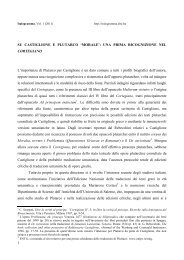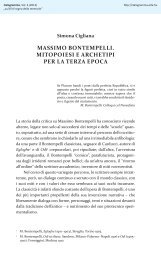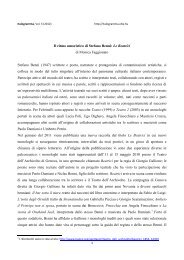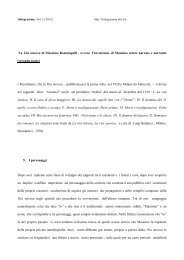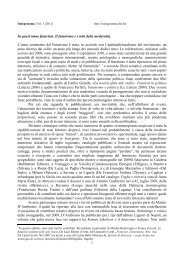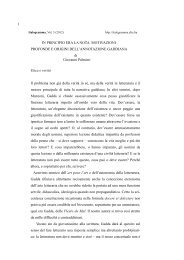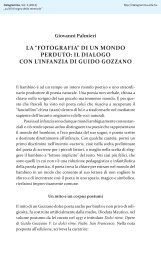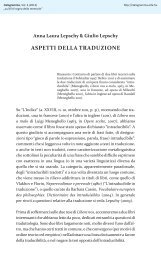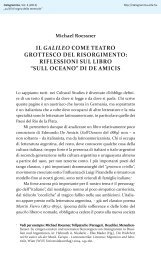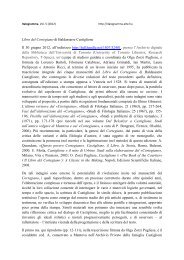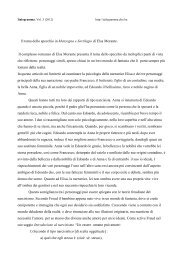- Page 3:
“sul fil di ragno della memoria
- Page 6 and 7:
A cura di Franciska d’Elhoungne H
- Page 9 and 10:
Anna Laura Lepschy & Giulio Lepschy
- Page 11 and 12:
ASPETTI DELLA TRADUZIONE 9 come ris
- Page 13 and 14:
ASPETTI DELLA TRADUZIONE 11 mo rinv
- Page 15 and 16:
ASPETTI DELLA TRADUZIONE 13 “gesp
- Page 17 and 18:
ASPETTI DELLA TRADUZIONE 15 sempre
- Page 19 and 20:
E quella inglese (Meneghello 2011:7
- Page 21 and 22:
Fausto De Michele CAMILLERI IN EURO
- Page 23 and 24:
CAMILLERI IN EUROPA. ESPERIENZE TRA
- Page 25 and 26:
CAMILLERI IN EUROPA. ESPERIENZE TRA
- Page 27 and 28:
CAMILLERI IN EUROPA. ESPERIENZE TRA
- Page 29 and 30:
CAMILLERI IN EUROPA. ESPERIENZE TRA
- Page 31 and 32:
CAMILLERI IN EUROPA. ESPERIENZE TRA
- Page 33 and 34:
CAMILLERI IN EUROPA. ESPERIENZE TRA
- Page 35 and 36:
Franca Bosc TRADUZIONE INTRALINGUIS
- Page 37 and 38:
TRADUZIONE INTRALINGUISTICA DI UN T
- Page 39 and 40: TRADUZIONE INTRALINGUISTICA DI UN T
- Page 41 and 42: TRADUZIONE INTRALINGUISTICA DI UN T
- Page 43 and 44: TRADUZIONE INTRALINGUISTICA DI UN T
- Page 45 and 46: TRADUZIONE INTRALINGUISTICA DI UN T
- Page 47: TRADUZIONE INTRALINGUISTICA DI UN T
- Page 50 and 51: 48 ZSUZSANNA FÁBIÁN essere ritenu
- Page 52 and 53: 50 ZSUZSANNA FÁBIÁN tiamo che in
- Page 54 and 55: 52 ZSUZSANNA FÁBIÁN fig. 2 da col
- Page 56 and 57: 54 ZSUZSANNA FÁBIÁN un corpus non
- Page 58 and 59: 56 ZSUZSANNA FÁBIÁN ban korlátoz
- Page 60 and 61: 58 ZSUZSANNA FÁBIÁN dictionnaires
- Page 62 and 63: 60 GIAMPAOLO SALVI (1) Piove (2) a.
- Page 64 and 65: 62 GIAMPAOLO SALVI (6) a. Ho visto
- Page 66 and 67: 64 GIAMPAOLO SALVI (7) a. Qui sono
- Page 68 and 69: 66 GIAMPAOLO SALVI da un esame di q
- Page 70 and 71: 68 GIAMPAOLO SALVI sono spesso regg
- Page 72 and 73: 70 GIAMPAOLO SALVI Nelle varietà l
- Page 75 and 76: Maria Soresina PERCHÉ LEGGERE DANT
- Page 77 and 78: PERCHÉ LEGGERE DANTE OGGI? 75 ispi
- Page 79 and 80: PERCHÉ LEGGERE DANTE OGGI? 77 conf
- Page 81 and 82: PERCHÉ LEGGERE DANTE OGGI? 79 è u
- Page 83 and 84: Olga Zorzi Pugliese SENSORIAL LANGU
- Page 85 and 86: SENSORIAL LANGUAGE IN MACHIAVELLI
- Page 87 and 88: SENSORIAL LANGUAGE IN MACHIAVELLI
- Page 89: SENSORIAL LANGUAGE IN MACHIAVELLI
- Page 93 and 94: SENSORIAL LANGUAGE IN MACHIAVELLI
- Page 95 and 96: Michael Roessner IL GALILEO COME TE
- Page 97 and 98: IL GALILEO COME TEATRO GROTTESCO DE
- Page 99 and 100: IL GALILEO COME TEATRO GROTTESCO DE
- Page 101: IL GALILEO COME TEATRO GROTTESCO DE
- Page 104 and 105: 102 GIOVANNI PALMIERI A voi cari bi
- Page 106 and 107: 104 GIOVANNI PALMIERI scipìta / pe
- Page 108 and 109: 106 GIOVANNI PALMIERI Discesi dal l
- Page 110 and 111: 108 […] GIOVANNI PALMIERI Molto n
- Page 112 and 113: 110 GIOVANNI PALMIERI Un po’ ci s
- Page 114 and 115: 112 GIOVANNI PALMIERI perduto e orm
- Page 116 and 117: 114 GIOVANNI PALMIERI è profano è
- Page 119 and 120: Simona Cigliana MASSIMO BONTEMPELLI
- Page 121 and 122: MASSIMO BONTEMPELLI. MITOPOIESI E A
- Page 123 and 124: MASSIMO BONTEMPELLI. MITOPOIESI E A
- Page 125 and 126: MASSIMO BONTEMPELLI. MITOPOIESI E A
- Page 127 and 128: MASSIMO BONTEMPELLI. MITOPOIESI E A
- Page 129 and 130: MASSIMO BONTEMPELLI. MITOPOIESI E A
- Page 131: MASSIMO BONTEMPELLI. MITOPOIESI E A
- Page 134 and 135: 132 ANNA STORTI regolarità per qua
- Page 136 and 137: 134 ANNA STORTI reale conoscenza de
- Page 138 and 139: 136 ANNA STORTI difficile, correndo
- Page 140 and 141:
138 ANNA STORTI mentale [...], ma p
- Page 143 and 144:
Alessandra Sorrentino L‘ISOLA DI
- Page 145 and 146:
L‘ISOLA DI ARTURO 143 l‘abbando
- Page 147 and 148:
L‘ISOLA DI ARTURO 145 La voce nar
- Page 149 and 150:
L‘ISOLA DI ARTURO 147 è la terra
- Page 151 and 152:
L‘ISOLA DI ARTURO 149 Ci troviamo
- Page 153 and 154:
L‘ISOLA DI ARTURO 151 del padre,
- Page 155 and 156:
L‘ISOLA DI ARTURO 153 Le sue vuln
- Page 157 and 158:
L‘ISOLA DI ARTURO 155 Merce di sc
- Page 159 and 160:
Giuliana Sanguinetti Katz MITI E RI
- Page 161 and 162:
MITI E RITUALI NELLA LETTERATURA DE
- Page 163 and 164:
MITI E RITUALI NELLA LETTERATURA DE
- Page 165 and 166:
MITI E RITUALI NELLA LETTERATURA DE
- Page 167 and 168:
Eleonora Conti GEOGRAFIE IDENTITARI
- Page 169 and 170:
GEOGRAFIE IDENTITARIE NELLA NARRATI
- Page 171 and 172:
GEOGRAFIE IDENTITARIE NELLA NARRATI
- Page 173 and 174:
GEOGRAFIE IDENTITARIE NELLA NARRATI
- Page 175 and 176:
GEOGRAFIE IDENTITARIE NELLA NARRATI
- Page 177:
GEOGRAFIE IDENTITARIE NELLA NARRATI
- Page 180 and 181:
178 MONICA JANSEN riforma dei vari
- Page 182 and 183:
180 MONICA JANSEN suo romanzo ma pi
- Page 184 and 185:
182 MONICA JANSEN Non usciremo dall
- Page 186 and 187:
184 MONICA JANSEN in rassegna, il t
- Page 188 and 189:
186 MONICA JANSEN zionali che polit
- Page 190 and 191:
188 MONICA JANSEN e il 2010 e metto
- Page 192 and 193:
190 ÁGNES LUDMANN aspetti (stile,
- Page 194 and 195:
192 ÁGNES LUDMANN tosto semplice:
- Page 196 and 197:
194 ÁGNES LUDMANN al narratore, se
- Page 198 and 199:
196 ÁGNES LUDMANN le radiazioni el
- Page 201 and 202:
Adalgisa Giorgio UN ESEMPIO DI POST
- Page 203 and 204:
UN ESEMPIO DI POSTMODERNO NAPOLETAN
- Page 205 and 206:
UN ESEMPIO DI POSTMODERNO NAPOLETAN
- Page 207 and 208:
UN ESEMPIO DI POSTMODERNO NAPOLETAN
- Page 209 and 210:
UN ESEMPIO DI POSTMODERNO NAPOLETAN
- Page 211 and 212:
UN ESEMPIO DI POSTMODERNO NAPOLETAN
- Page 213 and 214:
UN ESEMPIO DI POSTMODERNO NAPOLETAN
- Page 215 and 216:
Elvio Guagnini AGLI INFERI CON DANT
- Page 217 and 218:
AGLI INFERI CON DANTE E FREUD. NEL
- Page 219 and 220:
AGLI INFERI CON DANTE E FREUD. NEL
- Page 221 and 222:
Silvia Gavuzzo-Stewart PIRANESI E I
- Page 223 and 224:
PIRANESI E IL SUO PRIMO MECENATE NI
- Page 225 and 226:
PIRANESI E IL SUO PRIMO MECENATE NI
- Page 227 and 228:
PIRANESI E IL SUO PRIMO MECENATE NI
- Page 229 and 230:
PIRANESI E IL SUO PRIMO MECENATE NI
- Page 231 and 232:
PIRANESI E IL SUO PRIMO MECENATE NI
- Page 233 and 234:
PIRANESI E IL SUO PRIMO MECENATE NI
- Page 235 and 236:
PIRANESI E IL SUO PRIMO MECENATE NI
- Page 237 and 238:
Anna Pullia - Dávid Falvay LA SACR
- Page 239 and 240:
LA SACRA RAPPRESENTAZIONE FIORENTIN
- Page 241 and 242:
LA SACRA RAPPRESENTAZIONE FIORENTIN
- Page 243 and 244:
LA SACRA RAPPRESENTAZIONE FIORENTIN
- Page 245 and 246:
LA SACRA RAPPRESENTAZIONE FIORENTIN
- Page 247 and 248:
LA SACRA RAPPRESENTAZIONE FIORENTIN
- Page 249:
LA SACRA RAPPRESENTAZIONE FIORENTIN
- Page 252 and 253:
250 ESZTER SZEGEDI genere, la favol
- Page 254 and 255:
252 ESZTER SZEGEDI scutendo le orig
- Page 256 and 257:
254 ESZTER SZEGEDI “I Satyri, i S
- Page 258 and 259:
256 ESZTER SZEGEDI te comico chiama
- Page 261 and 262:
Claudio Vicentini PROBLEMI DI TEORI
- Page 263 and 264:
PROBLEMI DI TEORIA DELLA RECITAZION
- Page 265 and 266:
PROBLEMI DI TEORIA DELLA RECITAZION
- Page 267 and 268:
PROBLEMI DI TEORIA DELLA RECITAZION
- Page 269 and 270:
Gerardo Guccini INTORNO ALLO SCHIAF
- Page 271 and 272:
INTORNO ALLO SCHIAFFO DI NORINA: UN
- Page 273 and 274:
INTORNO ALLO SCHIAFFO DI NORINA: UN
- Page 275 and 276:
INTORNO ALLO SCHIAFFO DI NORINA: UN
- Page 277 and 278:
INTORNO ALLO SCHIAFFO DI NORINA: UN
- Page 279 and 280:
INTORNO ALLO SCHIAFFO DI NORINA: UN
- Page 281 and 282:
INTORNO ALLO SCHIAFFO DI NORINA: UN
- Page 283:
INTORNO ALLO SCHIAFFO DI NORINA: UN
- Page 286 and 287:
284 GÜNTER BERGHAUS and to create
- Page 288 and 289:
286 GÜNTER BERGHAUS tion of humank
- Page 290 and 291:
288 GÜNTER BERGHAUS harmonies. 18
- Page 292 and 293:
290 GÜNTER BERGHAUS modern world.
- Page 294 and 295:
292 GÜNTER BERGHAUS off, Erberto C
- Page 296 and 297:
294 GÜNTER BERGHAUS ultimate objec
- Page 298 and 299:
296 GÜNTER BERGHAUS “The Futuris
- Page 300 and 301:
298 GÜNTER BERGHAUS KANDINSKY, Was
- Page 302 and 303:
300 GÜNTER BERGHAUS [PRAMPOLINI, E
- Page 304 and 305:
302 GÜNTER BERGHAUS WINGLER, Hans
- Page 306 and 307:
304 SILVIA CONTARINI Valentine de S
- Page 308 and 309:
306 SILVIA CONTARINI femminile ital
- Page 310 and 311:
308 SILVIA CONTARINI Il teatro dell
- Page 312 and 313:
310 SILVIA CONTARINI giochi di salo
- Page 314 and 315:
312 SILVIA CONTARINI sull’importa
- Page 317 and 318:
Marco De Marinis DECROUX E CRAIG: U
- Page 319 and 320:
DECROUX E CRAIG: UNA PICCOLA VICEND
- Page 321 and 322:
DECROUX E CRAIG: UNA PICCOLA VICEND
- Page 323 and 324:
DECROUX E CRAIG: UNA PICCOLA VICEND
- Page 325 and 326:
DECROUX E CRAIG: UNA PICCOLA VICEND
- Page 327:
DECROUX E CRAIG: UNA PICCOLA VICEND
- Page 330 and 331:
328 FULVIA AIROLDI NAMER Tribunale
- Page 332 and 333:
330 FULVIA AIROLDI NAMER Diego Fabb
- Page 334 and 335:
332 FULVIA AIROLDI NAMER di intelle
- Page 336 and 337:
334 FULVIA AIROLDI NAMER precedere
- Page 338 and 339:
336 FULVIA AIROLDI NAMER petuto qua
- Page 340 and 341:
338 FULVIA AIROLDI NAMER de non tan
- Page 342 and 343:
340 FULVIA AIROLDI NAMER ci ritiria
- Page 344 and 345:
342 FULVIA AIROLDI NAMER Le scene f
- Page 346 and 347:
344 FULVIA AIROLDI NAMER Siamo nel
- Page 349 and 350:
Judit Bárdos COLORI CALDI E FREDDI
- Page 351 and 352:
COLORI CALDI E FREDDI NE IL DESERTO
- Page 353 and 354:
COLORI CALDI E FREDDI NE IL DESERTO
- Page 355 and 356:
COLORI CALDI E FREDDI NE IL DESERTO
- Page 357 and 358:
COLORI CALDI E FREDDI NE IL DESERTO
- Page 359:
COLORI CALDI E FREDDI NE IL DESERTO
- Page 362 and 363:
360 SILVIA MEI fatti, Fanny & Alexa
- Page 364 and 365:
362 SILVIA MEI esperienze più radi
- Page 366 and 367:
364 SILVIA MEI cede ad abbozzare, s
- Page 368 and 369:
366 SILVIA MEI e sottolinea l’azi
- Page 370 and 371:
368 SILVIA MEI oniriche o psichiche
- Page 372 and 373:
370 SILVIA MEI a molte altre cose c
- Page 374 and 375:
372 SILVIA MEI che l’ha prodotto
- Page 376 and 377:
374 SILVIA MEI Ipercorpo: spaesamen
- Page 379 and 380:
Kinga Szokács IL TEATRO SOCIALE NE
- Page 381 and 382:
IL TEATRO SOCIALE NELL’ERA DELLA
- Page 383:
IL TEATRO SOCIALE NELL’ERA DELLA
- Page 386 and 387:
384 TAMARA TÖRÖK ma vinse in tant
- Page 388 and 389:
386 TAMARA TÖRÖK la Seconda Guerr
- Page 390 and 391:
388 TAMARA TÖRÖK A questo tipo di
- Page 392 and 393:
390 TAMARA TÖRÖK di ogni sacralit
- Page 394 and 395:
392 TAMARA TÖRÖK se l’epoca del
- Page 396 and 397:
394 TAMARA TÖRÖK Tanti piccoli gr
- Page 398 and 399:
396 RENATE LUNZER a Vienna; Bertha
- Page 400 and 401:
398 RENATE LUNZER veteroromana” 2
- Page 402 and 403:
400 RENATE LUNZER mondiale della pa
- Page 404 and 405:
402 RENATE LUNZER razzista dei segu
- Page 406 and 407:
404 RENATE LUNZER ni politici, gove
- Page 408 and 409:
406 ANNA MILLO All’interno di que
- Page 410 and 411:
408 ANNA MILLO disegni di Mussolini
- Page 412 and 413:
410 ANNA MILLO Il movimento naziona
- Page 414 and 415:
412 ANNA MILLO l’interconnessione
- Page 416 and 417:
414 ANNA MILLO rimanere ai loro pos
- Page 419 and 420:
Marta Petricioli IL FASCISMO E GLI
- Page 421 and 422:
IL FASCISMO E GLI ITALIANI ALL’ES
- Page 423 and 424:
IL FASCISMO E GLI ITALIANI ALL’ES
- Page 425 and 426:
IL FASCISMO E GLI ITALIANI ALL’ES
- Page 427 and 428:
IL FASCISMO E GLI ITALIANI ALL’ES
- Page 429 and 430:
IL FASCISMO E GLI ITALIANI ALL’ES
- Page 431 and 432:
Carla Meneguzzi Rostagni IL RACCONT
- Page 433 and 434:
IL RACCONTO DI UN’INCOMPRENSIONE
- Page 435 and 436:
IL RACCONTO DI UN’INCOMPRENSIONE
- Page 437 and 438:
IL RACCONTO DI UN’INCOMPRENSIONE
- Page 439 and 440:
Donatella Cherubini “THE VANISHIN
- Page 441 and 442:
“THE VANISHING NEWSPAPER”. IL G
- Page 443 and 444:
“THE VANISHING NEWSPAPER”. IL G
- Page 445 and 446:
“THE VANISHING NEWSPAPER”. IL G
- Page 447 and 448:
“THE VANISHING NEWSPAPER”. IL G
- Page 449 and 450:
“THE VANISHING NEWSPAPER”. IL G
- Page 451:
“THE VANISHING NEWSPAPER”. IL G
- Page 454 and 455:
452 PINO MASNATA (MARGARET FISHER)
- Page 456 and 457:
454 PINO MASNATA (MARGARET FISHER)
- Page 458 and 459:
456 PINO MASNATA (MARGARET FISHER)
- Page 460 and 461:
458 PINO MASNATA (MARGARET FISHER)
- Page 462 and 463:
460 PINO MASNATA (MARGARET FISHER)
- Page 464 and 465:
462 PINO MASNATA (MARGARET FISHER)
- Page 466 and 467:
464 PINO MASNATA (MARGARET FISHER)
- Page 468 and 469:
466 PINO MASNATA (MARGARET FISHER)
- Page 470 and 471:
468 PINO MASNATA (MARGARET FISHER)
- Page 472 and 473:
470 PINO MASNATA (MARGARET FISHER)
- Page 475 and 476:
Paolo Puppa IL LAMENTO DI GIROLAMO
- Page 477 and 478:
IL LAMENTO DI GIROLAMO 475 agapete.
- Page 479 and 480:
IL LAMENTO DI GIROLAMO 477 Deuteron
- Page 481 and 482:
IL LAMENTO DI GIROLAMO 479 vi di av
- Page 483 and 484:
IL LAMENTO DI GIROLAMO 481 lavasser
- Page 485 and 486:
IL LAMENTO DI GIROLAMO 483 in cielo
- Page 487 and 488:
IL LAMENTO DI GIROLAMO 485 ratore V
- Page 489:
IL LAMENTO DI GIROLAMO 487 Non veni
- Page 492 and 493:
490 INDICE ANNA STORTI (Università
- Page 494:
492 INDICE CARLA MENEGUZZI ROSTAGNI


